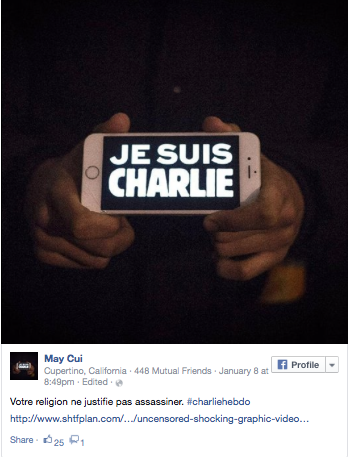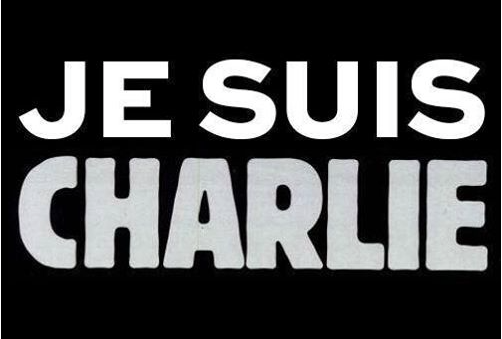When junior Vidhi Tibrewala came to school on Thursday Jan. 8, she did not know about the Charlie Hebdo attack in Paris. When someone mentioned it in her second period British Literature class, she asked her classmate what happened.
Just some shooting. Very sad. Tibrewala moved on to third period with French teacher Melanie Lhomme.
As always, the agenda was on the whiteboard. Among the usual “examen du subjonctif” (subjunctive test), “commencons” (warm-up) and “chanson” (song), “Charlie Hebdo” was written. After class started, students nervously prepared for their quiz on subjunctive tense. After the small quiz, Lhomme turned off the front lights of the large room and turned on the projector.
Though students often get lost in the Moulin Rouge posters, French comics and their culture projects that decorate the room, they listened intently to their teary-eyed teacher.
On Thursday, Jan. 8, Lhomme and French teacher Sarah Finck decided to discuss the Jan. 7 terrorist attack in Paris with their classes.
The previous morning, three gunmen stormed the building of French satirical magazine Charlie Hebdo, killing one policeman and 11 magazine staff members. The magazine publishes satirical cartoons on politics weekly, and their regular satirization of Islam prompted the attack. As Lhomme explained, the cartoons are not always politically correct, so they accumulate backlash and it’s hard to determine when threats are serious.
“It’s a huge event, like a smaller scale 9/11 because obviously not as many lives were lost,” Lhomme said. “But the message is almost scarier: ‘You don’t have the right to say this, if you do, we’ll shoot you.’”
After explaining the event and its impact in France, Lhomme played a video of Secretary of State John Kerry’s address to France. Kerry spoke in French to express his and America’s condolences.
“I watched French news last night and they showed the clips of John Kerry several times,” Lhomme said. “It was very touching to French people, that Americans are supporting them.”
Some students came in to class knowing absolutely nothing about the tragedy, some like Tibrewala had heard it mentioned here and there, and others, like sophomore Anvey Jawadekar, knew a lot from watching or reading the news.
“The [Charlie Hebdo staff members] were just doing regular stuff which they had the rights to do,” Jawadekar said. “If you’re killed for showing your rights, then why even show freedom.”
Jawadekar initially heard about the attack when his family sat down for dinner as they all watched the news together. With his parents, he simply watched the breaking news and moved on. In class, Jawadekar explained, he was able to discuss and understand different perspectives, while also learning the impact on French society.
Students silently watched the ten-minute video in which Kerry expressed his condolences in a French accent that closely resembled their own. They read the article that Lhomme put up and observed the pictures while Lhomme explained what happened. They listened to Lhomme express the gravity of the shooting as she teared up.
Lhomme had two reasons in sharing with her classes. First, the students should know what happened, and second, students would learn the power of learning new languages. When Kerry spoke in French, he showed an immense amount of respect to France and he unified the two nations.
Before, the class had understood that Americans are different than the French. Students completed a project during first semester where they had to contrast French and American cultures and develop a separate fundamental value for each culture. Every student knows that France enjoys five weeks of vacation when America gives ten days. Lhomme has explained that the French detest snacking while Americans love it. The class has discussed why French people are like coconuts while Americans are like peaches.
But both countries value their freedom of the speech.
“We’ve talked about the differences in the cultures a lot,” Lhomme said. “But we’re living in a very similar world — we have similar things to be thinking about, similar goals that can be achieved together.”

After learning what happened in class, Tibrewala is set on reading more on the issue. She, Jawadekar and Lhomme believe that Muslims should not be grouped with these extremists. Tibrewala expressed that racism and hatred should not arise from this situation, instead everyone should just be aware.
“It is important,” Tibrewala said. “Everyone should care.”
Lhomme plans to follow up in later classes to ask students what they have found and learned about the shooting. She explained that students can take action in three basic ways. Lhomme stated that the easiest move is to change Facebook profile pictures to the popular “Je Suis Charlie” (I am Charlie) logo. Students can also like the “Je Suis Charlie” Facebook page or discuss the theme of freedom of speech amongst themselves.
“Follow the French message of we’re not going to back down and be afraid,” Lhomme said. “We’re going to defend our liberty.”














